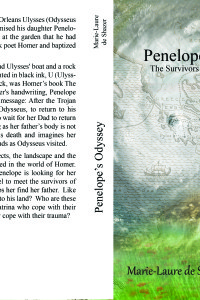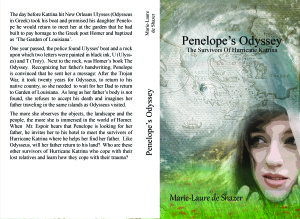1 – Ulysses in the Garden of Louisiana
I was in Athena with my mother when Hurricane Katrina battered New Orleans. On that same day, I heard a mysterious sound of wailing which shattered the silence of my hotel room.
“What is it?” I gasped.
“Penelope, it is probably the wind!” my mother replied.
“The wind!” I exclaimed, giving her a look of wonder since there was no breeze outside. At that moment, I had a premonition that an accident would happen to my father.
One week ago, my father asked me to kneel down before the statue of Poseidon, god of the sea, and pray to him for the safety of his voyage. My friends, fond of Greek mythology, had idealized my father and given him a nickname: Ulysses (Odysseus in Greek) because he was an exceptional and gifted captain who could navigate his ship smoothly and return home despite the bad weather and boisterous seas.
One month passed. Despite the mass evacuation of the inhabitants from New Orleans, my mother and I decided to return to Louisiana. When we arrived in the city, we felt both powerless and angry at seeing the devastated and bleak landscape.
Entire buildings and homes were blasted away. Municipal vehicles, police cars, and fire trucks were gone, swept away by the fury of Katrina. While we were walking together along a muddy path strewn with objects protruding at odd angles, we shielded ourselves from the howling wind that pushed through the doors of the abandoned houses.
Shivering with cold and confusion, we gazed at the bleak and desolate landscape while pain stabbed our stomachs. Katrina had hit unexpectedly, leaving shock, dismay, and shattered lives in her wake. My dear Louisiana was wounded and irremediably damaged. It broke my heart to see the city suffering with its inhabitants’ tears flowing unchecked, like the dusky, dancing waves of the ocean. Aeolus, god of the winds, seemed to whisper in my ears, “Louisiana is cursed!”
After we walked across a clearing, past a pile of discarded furniture, bottles, cans and a pile of debris, we finally arrived at the entrance of our house. We were relieved and glad that Katrina had not demolished our property, but our joy vanished when Grandpa greeted us with a queer, almost pitying look on his face and announced, “The day before Katrina, your dad took his boat and has not returned to meet us at the garden that he had built and baptized as ‘The Garden of Louisiana’”.
A shiver of emotion passed down my pink cheeks, I turned pale and this bad news distressed me. My stomach tightened into a fist. Tears chocked my throat. Seeing a worried look on my face, my grandpa, in an attempt to appease me, said in a soothing voice, “Penelope, do not worry! Your father will return soon.”
“When?” I asked.
“I do not know when, but don’t forget that your father is like Ulysses, a man like him never fails to return home no matter the difficulties he encounters on his road. So be patient as Penelope was during the Trojan War,” my grandpa replied.
“How long did Penelope wait for Ulysses’ return?” I wondered aloud.
“More than ten years, so be patient. To appease your fears, you should read The Odyssey by Homer and think of the goddess Athena,” my grandpa interjected.
“The Greek goddess?” I echoed.
“Yes, the Greek goddess. She helped Ulysses return home. Think of this goddess, and she will help you overcome your fears and help your dad return home,” my grandpa responded.
“How can I meet her?” I questioned.
“You only need to worship her. Moreover, the objects, the landscape, and the people that you will see and observe will enable you to imagine your father traveling in the same islands as Ulysses went to.”
Unable to control myself, I burst into tears. Sobbing in torment, I cried out, “But maybe his boat was destroyed by the fury of Katrina and maybe…he is dead or his ship wrecked. What would we do if his boat sank?”
My words were so appalling to my grandpa that he walked to the door, and left the room without answering my question. Tears slid across my lips to the corner of my mouth.
As for my mother, she remained silent, sewing on her white bed sheets, which reminded me of the voile that father used to lower every time he returned from his trips. S eeing my mother engrossed in her embroidery work, I also exited the room.
A few minutes later, I went outside and took the road that led to the Garden of Louisiana. While I was walking up and down, I thought of my childhood and the origin of my name. When I was born, my mother was so disappointed to have a girl that she asked my father to choose my name. He suggested Penelope. Astonished, my mother asked, ”Why did you choose Penelope?”
My father smiled and said merrily, “If Ulysses had had a daughter he would have chosen this name.”
Since that day, my mother accepted me as a daughter, and I was a happy child. Ten years later, my father decided to build a garden that he named the Garden of Louisiana. I still remember that day my father took me to this place for the first time. It was the early summer of 2002, we walked through the streets of New Orleans as the hot sun beamed upon our humid feet.
“Penelope, what you are going to see now, is unique and beautiful.”
“What is it?”
“A garden.”
“A garden?” I repeated.
“Yes, I built this garden to pay homage to the Greek poet, Homer and ancient Greece, which implemented democracy.”
“And what are we going to do there?” I asked, intrigued.
“Well, the tradition is every time you visit this garden you will not only have to play a character of the Trojan War, but you also preserve the dead languages and ancient cultures.”
“Everybody will be allowed to visit your garden?”
“Yes, and entrance into this garden will be free, and I will allow everybody to visit this place.”
“Even Grandma?”
“Of course,” sighed gloomy my father, “her soul would wander about the Garden of Louisiana. Deceased people are also welcome.”
Shortly after I was born, my grandma, whose origins were Greek, died of cancer. To appease the death of his mother, my dad decided to build the Garden of Louisiana. And before Katrina swept away New Orleans, it was there that I used to play the Trojan War with him. My father disguised as Ulysses, and I, dressed up as Penelope, were acting as if we were married. Braving the gods and the storm, my father was struggling to return to Ithaca and reach my arms.
Like the Trojan War did with Penelope and Ulysses, Katrina separated my father from me. When I reached the garden, I was relieved and happy that Katrina had not destroyed my father’s two favorite oak trees. It was in front of these two trees that my father and I arranged the date of his return, and when he drew up anchor, I was perched high in the tree, looking at his boat leaving the harbor.
As I continued wandering about the garden, I squeezed my eyes tightly trying to remember the past. Memories welled up from the depth of my mind and I saw my father running and fighting to deliver Helen of Troy, the most beautiful woman in the world. The noise of javelins and spears resounded in the magic garden. While my father was struggling to deliver Helen of Troy, I was fighting to see him again!
Tired of thinking, I sat upon a rock, took a pen out of my bag and attempted to write, but I was unable to find words to fill in the pages. Besides, my pen was leaking as the tears of sorrow were streaming down my face and wet the damaged grass.
The black ink on the ground reminded that Katrina had erased my father’s footprints. I was looking up at the grey sky mimicking my mood when suddenly the leaves that clung to the trees dropped to the ground, leaving the naked branches rocking in the wind. Seeing and hearing the broken and roaring branches lay on the ground, I thought about my father’s arms that Katrina separated from mine, and I rushed to quickly leave the Garden of Louisiana whose paths were invaded by a pile of debris and resembled the ruins of Athens.
Penelope’s Odyssey: the Survivors of Katrina Description:
The day before Katrina hit New Orleans Ulysses (Odysseus in Greek) took his boat and promised his daughter Penelope he would return to meet her at the garden that he had built to pay homage to the Greek poet Homer and baptized as ‘The Garden of Louisiana’.
One year passed, the police found Ulysses’ boat and a rock upon which two letters were painted in black ink, U (Ulysses) and T (Troy). Next to the rock, was Homer’s book The Odyssey. Recognizing her father’s handwriting, Penelope is convinced that he sent her a message: After the Trojan War, it took twenty years for Odysseus, to return to his native country, so she needed to wait for her Dad to return to Garden of Louisiana. As long as her father’s body is not found, she refuses to accept his death and imagines her father traveling in the same islands as Odysseus visited.
The more she observes the objects, the landscape and the people, the more she is immersed in the world of Homer. When Mr. Espoir hears that Penelope is looking for her father, he invites her to his hotel to meet the survivors of Hurricane Katrina where he helps her find her father. Like Odysseus, will her father return to his land?
Who are these other survivors of Hurricane Katrina who cope with their lost relatives and learn how they cope with their trauma?




